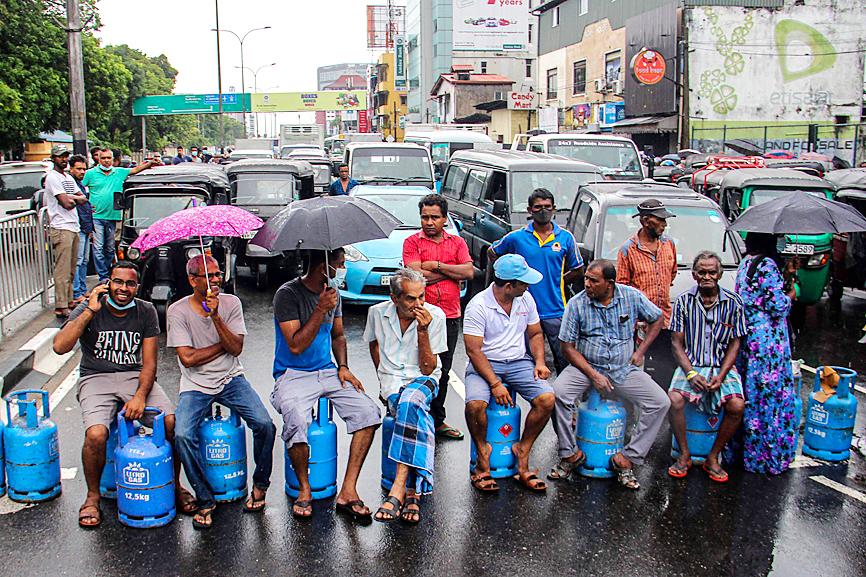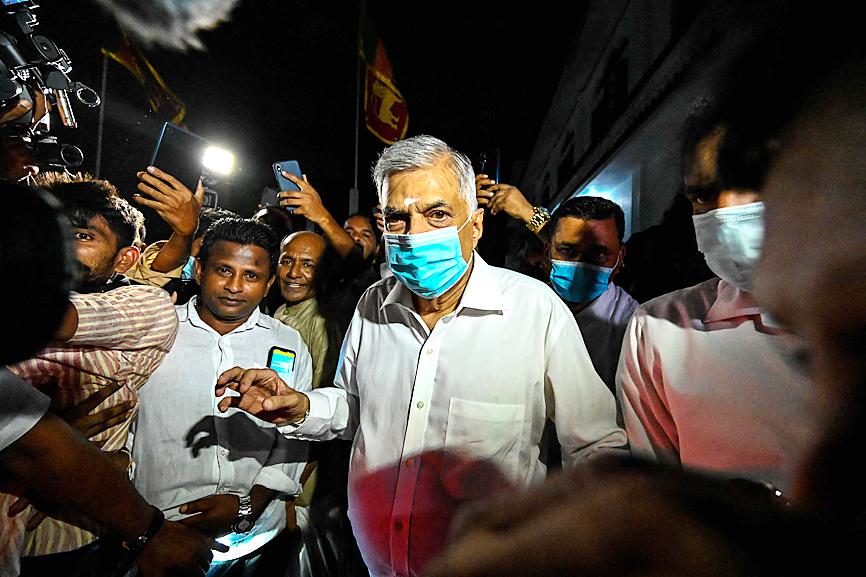Sri Lanka’s new prime minister yesterday struggled to forge a unity government and forestall an imminent economic collapse, as opposition lawmakers refused to join his Cabinet and demanded fresh elections.
Ranil Wickremesinghe was sworn in late on Thursday to navigate his country through the worst downturn in its history as an independent nation, with months of shortages and blackouts inflaming public anger.
The 73-year-old insists that he has enough support to govern and approached several legislators to join him, but three opposition parties have already said his premiership lacks legitimacy.

Photo: AFP
Senior opposition lawmaker Harsha de Silva rejected an overture to take charge of the finance ministry and said he would instead push for the government’s resignation.
“People are not asking for political games and deals, they want a new system that will safeguard their future,” he said in a statement.
De Silva said that he was joining “the people’s struggle” to topple Sri Lankan President Gotabaya Rajapaksa and would not support any political settlement that left the leader in place.

Photo: AFP
Huge public demonstrations have for weeks condemned Rajapaksa over his administration’s mismanagement of the worsening economic crisis.
Hundreds remain outside his seafront office in the capital, Colombo, at a protest camp that has for the past month campaigned for him to step down.
De Silva is a member of the Samagi Jana Balawegaya, the largest single opposition grouping in parliament, which had appeared ready to split over the question of whether to support Wickremesinghe.
The head of the possible splinter faction, Harin Fernando, yesterday said he had returned to the fold.
“I will not support Wickremesinghe’s government,” Fernando said.
Two smaller parties have also signaled that they would not join any unity government.
The Tamil National Alliance said that Rajapaksa’s administration had “completely lost legitimacy” with the appointment of Wickremesinghe, a five-time former prime minister who most recently held office in 2019.
The leftist People’s Liberation Front (JVP) said that new national elections were the only way out of the current impasse.
“We can’t solve the economic crisis by having an illegitimate government,” JVP leader Anura Dissanayake told reporters in Colombo. “We demand fresh elections.”
The cash-strapped government is unlikely to be able to afford polls, or even print ballots, at a time when a national paper shortage forced schools to postpone exams.
Parliamentary elections are not due until August 2025.
Sri Lankans have experienced months of severe shortages of food, fuel and medicine — as well as long power cuts — after the country burnt through foreign currency reserves needed to pay for vital imports.
Wickremesinghe on Thursday warned that the dire situation could get worse in the coming months and called for international assistance.
“We want to return the nation to a position where our people will once again have three meals a day,” he said.
Mahinda Rajapaksa, the president’s brother, resigned as prime minister on Monday after his supporters attacked anti-government demonstrators who had been protesting peacefully.

‘IN A DIFFERENT PLACE’: The envoy first visited Shanghai, where he attended a Chinese basketball playoff match, and is to meet top officials in Beijing tomorrow US Secretary of State Antony Blinken yesterday arrived in China on his second visit in a year as the US ramps up pressure on its rival over its support for Russia while also seeking to manage tensions with Beijing. The US diplomat tomorrow is to meet China’s top brass in Beijing, where he is also expected to plead for restraint as Taiwan inaugurates president-elect William Lai (賴清德), and to raise US concerns on Chinese trade practices. However, Blinken is also seeking to stabilize ties, with tensions between the world’s two largest economies easing since his previous visit in June last year. At the
Nearly half of China’s major cities are suffering “moderate to severe” levels of subsidence, putting millions of people at risk of flooding, especially as sea levels rise, according to a study of nationwide satellite data released yesterday. The authors of the paper, published by the journal Science, found that 45 percent of China’s urban land was sinking faster than 3mm per year, with 16 percent at more than 10mm per year, driven not only by declining water tables, but also the sheer weight of the built environment. With China’s urban population already in excess of 900 million people, “even a small portion

UNSETTLING IMAGES: The scene took place in front of TV crews covering the Trump trial, with a CNN anchor calling it an ‘emotional and unbelievably disturbing moment’ A man who doused himself in an accelerant and set himself on fire outside the courthouse where former US president Donald Trump is on trial has died, police said yesterday. The New York City Police Department (NYPD) said the man was declared dead by staff at an area hospital. The man was in Collect Pond Park at about 1:30pm on Friday when he took out pamphlets espousing conspiracy theories, tossed them around, then doused himself in an accelerant and set himself on fire, officials and witnesses said. A large number of police officers were nearby when it happened. Some officers and bystanders rushed

Beijing is continuing to commit genocide and crimes against humanity against Uyghurs and other Muslim minorities in its western Xinjiang province, U.S. Secretary of State Antony Blinken said in a report published on Monday, ahead of his planned visit to China this week. The State Department’s annual human rights report, which documents abuses recorded all over the world during the previous calendar year, repeated language from previous years on the treatment of Muslims in Xinjiang, but the publication raises the issue ahead of delicate talks, including on the war in Ukraine and global trade, between the top U.S. diplomat and Chinese